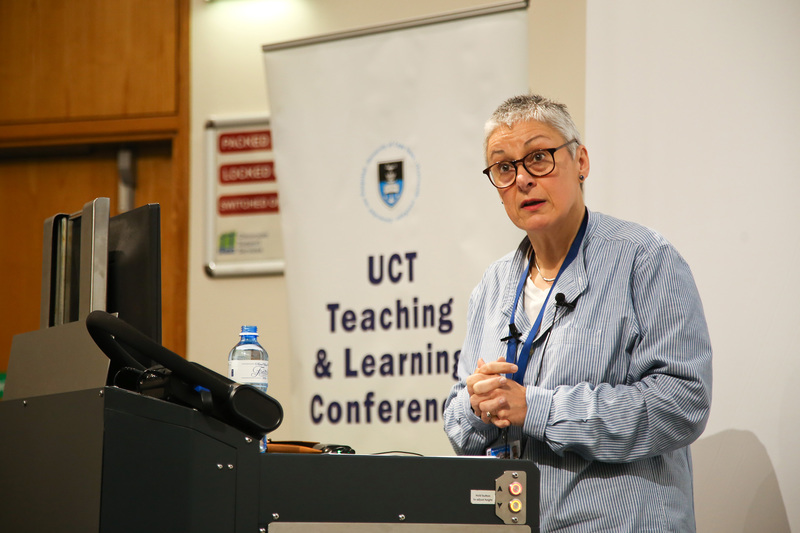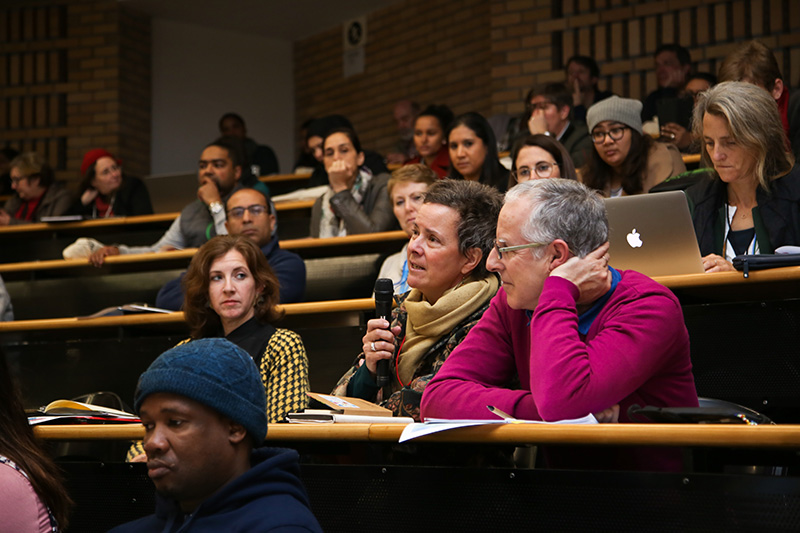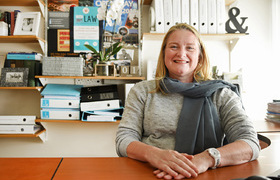Adopt Mbembe’s ‘pedagogies of presence’ – Lis Lange
20 July 2018 | Story Helen Swingler. Photo Je’nine May. Read time 8 min.
Deputy Vice-Chancellor for Teaching and Learning, Associate Professor Lis Lange, has called on the university community to build a collective sense and common purpose around student success and experience at the University of Cape Town (UCT). This, she said, is imperative if UCT is to achieve the same level of academic excellence as its research enterprise.
Lange was speaking at the opening of the 2018 Teaching and Learning Conference on 17 July, with its theme ‘Care. Connect. Create.’
Lange said that at the heart of the change needed in the university’s teaching and learning approach is what Cameroonian philosopher, political theorist and public intellectual Achille Mbembe referred to as “pedagogies of presence”, a “set of mental dispositions” needed to change the status quo.
She challenged the academic community to become “critical agents” in defying the tacit institutional curriculum, first, by challenging UCT’s self-satisfaction with the current notions of excellence.
“The fact that we are the top research university in Africa and figure high up in the world rankings does not make us the top-rated university in teaching and learning. If we want to call ourselves excellent, we need to stretch our notions of excellence to teaching and learning – and sort out a few problems.”
These are that academic success at UCT is uneven and reflects race and class privilege. Second, the interface between students’ psychosocial and academic worlds is mediated by several services and infrastructures that are not in sync, and “some of which operate as if the others did not exist”. And third, that the curriculum, its content, pedagogy and organisation, is ill-suited to UCT’s students, and requires leadership in its redesign.
Harness impetus
In tackling the above, Lange urged the academic community to harness the critical impetus of the past three years of student-led protest under the Rhodes Must Fall (RMF) banner to initiate, at departmental level, curricula reviews that challenge the institutional curriculum. She said it is also imperative that UCT develops and centralises data-analytics capacity and the institutionalisation and use of evidence to modify teaching and learning practices.
“We must infuse into the university’s full curriculum what we have learnt in three decades of foundational courses in academic development. And we must accept, once and for all, that learning how to teach is not an optional aspect in the life of an academic.”
“And we must accept, once and for all, that learning how to teach is not an optional aspect in the life of an academic.”
“So here is my invitation to you: Let’s shake the complacency of being the top university in the country. Let’s use the extraordinary talent that resides in every faculty to stretch our notion of excellence to one that is more critical of itself, more encompassing and deeply rooted in the moral imperative of transformation.”
Lessons of history
As the backdrop to her address, Lange took the audience back 20 years to “the Mamdani affair”, which remains “one of the dark moments of post-apartheid UCT”.
Mahmood Mamdani, renowned Africanist scholar from Makerere in Uganda, visiting professor at Durban Westville and author of the award-winning Citizen and Subject, had been invited to UCT to design and lead a foundational semester course in African studies.
Even then, the event highlighted tensions between UCT’s institutional curriculum and an academic curriculum, academic freedom and administrative decision-making in relation to academic standards, as well as in the relationship between pedagogy and ontology.
“Their importance, then and now, is undeniable,” Lange said. “But what they called ‘the Mamdani affair’ was an epistemological problem that remained unnamed. What constituted valid knowledge of Africa? How was the subject of knowledge defined? Whose knowledge of Africa would be accepted as valid and, in a secondary line, was this preoccupation: To whom and how would this knowledge be taught? … It was clear that what Mamdani was proposing defied UCT’s academic conception of Africa and its knowledge.
“Mamdani went further and pointed out that UCT academics were offering a course that was morally and intellectually flawed.”
And now, almost 20 years later and under the banner of the RMF movement, another call has come for the university to implement a decolonised curriculum that critically examines Africa.
While the Mamdani Affair was kept strictly within the parameters of an academic dispute, RMF was a political protest that took on academic matters.

Critical mass of support
“From 2015 to 2017 all universities affected responded to the RMF protest and its variations, making way for conversations on the need to decolonise the curriculum. In 1998 UCT closed ranks against Mamdani, [but] after RMF some academics actually heeded the call for a decolonised curriculum … and this very [conference] programme suggests that there are a whole lot of people working on this problem in many inventive ways.”
But this work would require institutional support and the development of a critical mass of committed academics and supportive and active students, Lange added.
“In other words, the institutional curriculum needs to be deauthorised from inside the institution.”
“In other words, the institutional curriculum needs to be deauthorised from inside the institution.”
“I believe that another important condition is to solve, or at least understand, the obfuscation between identity and knowledge forced on the students by the institutional curriculum and work to disentangle this relationship.”
Pedagogies of presence
However, the students’ demand for recognition expressed in the RMF protests had conflated ontological and epistemological recognition, often reducing the decolonisation of the curriculum to Africanisation.
“As important, urgent and necessary as this is ontologically, the Africanisation of the curriculum as proposed by the RMF movement is epistemologically and politically isolating. This is for me the fundamental limit of an identity approach to pedagogy and curriculum. Instead, I would like to propose the following Achille Mbembe pedagogy and curriculum of ‘presence’.
“This represents an affirmation of the students and their blackness, of their selves, their bodies and their identities, and their intergenerational knowledge and their direct experience of the world.
“This requires a countermovement: the acknowledgement of the identity and the position of those who teach as well as white students in their privilege, but also in their lack. For changing the institutional curriculum to be profound, socially productive and worthwhile, it must not only focus on black students and black academics. If the university is to play a truly transformative role in our society, a priority of a ‘pedagogy of presence’ should help all of the university.”
It would also mean the university positioning itself “away from white mythologies, creating the possibility of the development of new, intersective relationships, new forms of learning and new respect for different modes of knowledge”.
“A pedagogy of presence would require the entire university to revisit its notions of student learning and reconsider the way students are taught. This has implications for language of instruction, the modalities of teaching, the notions of assessment and the understanding of the student as an individual and autonomous self.
“At the curricula level, a pedagogy of presence makes possible two important intellectual movements. One is the resizing of European knowledge and its provincialisation in a global world. The other is the incorporation of other epistemological traditions – African, Indian, Chinese, Latin American – in the horizon of global knowledge.”
 This work is licensed under a Creative Commons Attribution-NoDerivatives 4.0 International License.
This work is licensed under a Creative Commons Attribution-NoDerivatives 4.0 International License.
Please view the republishing articles page for more information.










